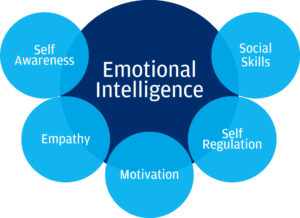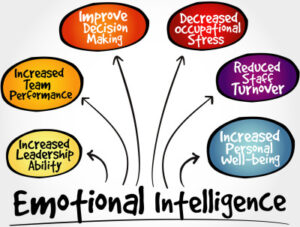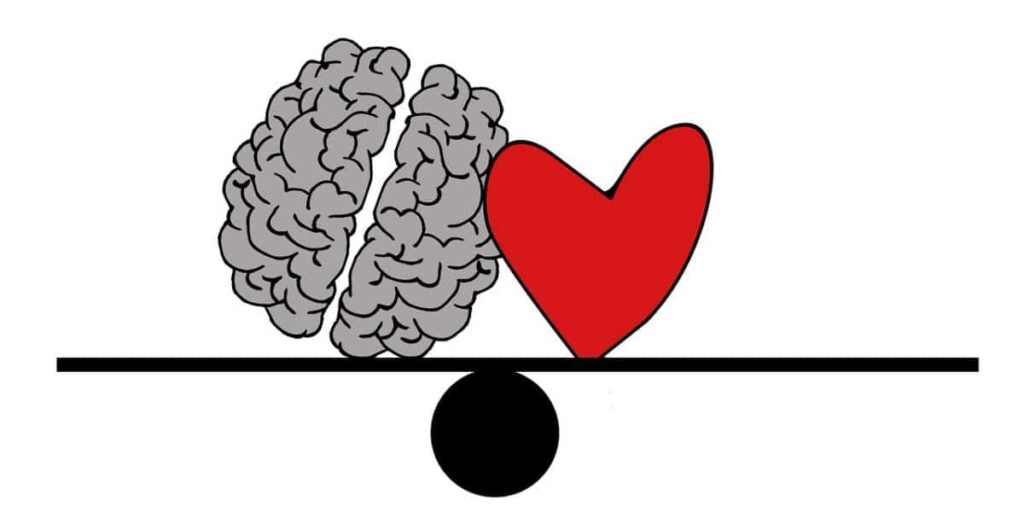Do you know that there are certain skills that can help you build and sustain meaningful relationships? Emotional intelligence is one of them, and it could be the key to a happy relationship. In this article, we will introduce the concept of emotional intelligence as well as discuss why it’s important to have.
Contents
- 1 Emotional Intelligence In Relationships
- 2 Skills Required For Emotional Intelligence
- 3 How To Develop These Skills To Improve Relationship?
- 4 Importance Of Emotional Intelligence In Relationships
- 5 Benefits Of High Emotional Intelligence In Relationships
- 6 How To Build Emotionally Intelligent Relationships?
- 6.1 1. Be aware of your emotions
- 6.2 2. Understand the emotions of others
- 6.3 3. Respond appropriately
- 6.4 4. Be fully engaged
- 6.5 5. Work on empathy
- 6.6 6. Show an interest in others
- 6.7 7. Collaborate with others
- 6.8 8. Use positive body language
- 6.9 9. Address sensitive subjects
- 6.10 10. View challenges as opportunities
- 6.11 12. Don’t hold grudges
- 6.12 13. Assume positive intent
- 6.13 14. Don’t hold back your emotions
- 7 How Do They Connect?
- 8 Conclusion
Emotional Intelligence In Relationships
 Emotional intelligence is important for healthy relationships because people are more likely to be able to manage their emotions in a productive way if they have emotional intelligence. If they are, for example, angry or upset with others, having emotional intelligence allows them to express these feelings inappropriate ways.
Emotional intelligence is important for healthy relationships because people are more likely to be able to manage their emotions in a productive way if they have emotional intelligence. If they are, for example, angry or upset with others, having emotional intelligence allows them to express these feelings inappropriate ways.
Second, developing skills in emotional intelligence can help you achieve your goals and improve your well-being. Individuals with high levels of emotional intelligence usually enjoy their lives more. They are able to build relationships, make a difference in other people’s lives, and live a fulfilling life.
Emotional intelligence is an important but often overlooked skill for healthy relationships because it allows you to manage your emotions in a productive way. If you have emotional intelligence, you can express your feelings appropriately while still being kind and considerate of the other people involved. Having low levels of emotional intelligence can make relationships more difficult for both parties because it is harder to understand each other’s emotions and needs when they are not expressed in a constructive manner.
Skills Required For Emotional Intelligence
Emotional intelligence is the capacity to be aware of and manage one’s own emotions, and the emotions of others. It is an important skill for managing relationships effectively.
There are four key skills involved in emotional intelligence:
1. Self-awareness: being aware of your own emotions and how they affect your thinking and behavior.
2. Self-regulation: being able to control your emotions, rather than being controlled by them.
3. Motivation: being driven by positive emotions, such as joy, happiness, love, and enthusiasm, rather than negative emotions, such as anger, fear, and anxiety.
4. Empathy: understanding the emotions of others and responding in a way that is helpful and constructive.
How To Develop These Skills To Improve Relationship?

There are several ways you can practice these skills. First, you can try to be more aware of your emotions. You can start keeping a daily journal where you write down how you are feeling at the current moment. Also, think back over the day and note any instances where you felt strong emotions.
Next, spend some time thinking about what led up to these feelings. For example, if you are feeling angry, think about what happened that might have caused this emotion.
Finally, try to find ways to cope with your emotions outside of these journal entries. For example, you could make an effort to keep your hands busy during conflict or tense situations.
Another way you can practice emotional intelligence is by asking for help when you need it. People who are successful at improving their emotional intelligence tend to be those that actively reach out for support and guidance from others. Others might not be aware of how you feel unless you speak up about it, so making the effort to ask for help can help improve your relationships. It is also a sign of strength and confidence to admit when something is difficult for you, and those around you will appreciate your honesty.
Importance Of Emotional Intelligence In Relationships

When it comes to relationships, emotional intelligence can be the key to a successful and happy one. Individuals with high levels of emotional intelligence are better able to manage their emotions, and this can lead to less conflict and more productive conversations.
Moreover, people with emotional intelligence tend to enjoy their lives more. They are able to build meaningful relationships, make a difference in other people’s lives, and live fulfilling life. This is because they are able to understand and empathize with the emotions of others.
So, why is emotional intelligence so important in relationships? There are four main reasons:
1. It helps prevent conflict.
2. It allows for more productive conversations.
3. It leads to a more fulfilling life
4. It helps you understand and empathize with the emotions of others.
Benefits Of High Emotional Intelligence In Relationships
 Emotional intelligence can be defined as “the ability to identify and manage your own emotions and the emotions of others.” It is an important but often overlooked skill for healthy relationships because it allows you to manage your emotions in a productive way. Individuals with high levels of emotional intelligence in relationships tend to be more successful at managing their emotions. And this can lead to less conflict and more productive conversations. Additionally, people who have high levels of emotional intelligence tend to enjoy their lives more. Since they are better able to build relationships, make a difference in other people’s lives, and live fulfilling lives.
Emotional intelligence can be defined as “the ability to identify and manage your own emotions and the emotions of others.” It is an important but often overlooked skill for healthy relationships because it allows you to manage your emotions in a productive way. Individuals with high levels of emotional intelligence in relationships tend to be more successful at managing their emotions. And this can lead to less conflict and more productive conversations. Additionally, people who have high levels of emotional intelligence tend to enjoy their lives more. Since they are better able to build relationships, make a difference in other people’s lives, and live fulfilling lives.
- People who have high EI are better able to understand their own behavior as well as the behaviors of others.
- People with a high EI tend to have more positive life experiences and are able to engage in fulfilling relationships.
- Those who have high EI tend to be more aware of their emotions and how they affect their behavior. They also pay close attention to the emotions of those around them, which gives them an advantage when creating personal and professional relationships.
- People who have a high EI are better able to manage their emotions in a positive way that can lead to less conflict and more productive conversations.
- Those with low levels of EI tend not to be aware of how they behave or the impact it has on others, which can lead to difficulty building relationships.
How To Build Emotionally Intelligent Relationships?
Great relationships are not always easy to come by. They take effort and work. The good news is that you can improve your relationships by working on your emotional intelligence. Emotional intelligence is the ability to be aware and understand your own emotions and the emotions of others. Here are a few tips on how to build emotionally intelligent relationships:
1. Be aware of your emotions
The first step in building emotionally intelligent relationships is to be aware of your own emotions. This means being able to identify how you’re feeling and what’s causing those feelings. When you’re aware of your own emotions, you can better manage them and respond more effectively to others.
2. Understand the emotions of others

order to build emotionally intelligent relationships, you need to be able to understand the emotions of others. Do they seem frustrated? Are they sad or happy? This requires empathy and being able to put yourself in their shoes. You don’t have to agree with everything someone else feels, but it’s important that you acknowledge their feelings and try to get a sense of why they’re feeling that way.
3. Respond appropriately
Once you become more aware of your own emotions and the emotions of those around you, the next step is learning how to respond appropriately. If someone is having a bad day, don’t take it personally if they seem irritated or short-tempered with you. Similarly, if someone seems really excited about something join the conversation rather than dismissing their feelings.
4. Be fully engaged
For emotionally intelligent relationships to work, you need to be fully engaged in the conversation and with the person, you’re talking to. Don’t check your phone or start going through your email while someone is speaking with you. Look at them when they’re talking and make sure to give them your undivided attention.
5. Work on empathy
Empathetic people tend to have a better understanding of others’ emotions and are able to build stronger relationships as a result. Being empathetic doesn’t mean that you have to agree with everything another person feels, but it does mean that you acknowledge their feelings and try putting yourself in their shoes from time to time. This includes being able to take a step back and look at a situation from another’s perspective.
6. Show an interest in others
In order for emotionally intelligent relationships to develop, you have to be interested in those around you. This means being curious about the people that are important to you. Try asking open-ended questions rather than close-ended ones as well as digging deeper into what people tell you about themselves or their interests.
7. Collaborate with others

To build good relationships, it helps if there is some sort of mutual accomplishment at stake whether this is a business partnership or a marriage. When both parties see something getting done, they will work harder and put more effort into the relationship. If your partner doesn’t seem interested in your collaboration, try to find another partner and see if that changes their tune.
8. Use positive body language
Positive body language is an important aspect of emotional intelligence because it can impact how you feel and how others perceive you. Make sure to stand up straight with good posture and keep a pleasant expression on your face when you’re speaking with other people. If you want to make yourself seem more relaxed, take deep breaths while inhaling through the nose and exhaling out the mouth.
9. Address sensitive subjects
Whether it’s going through a divorce or dealing with a recent layoff, there are going to be difficult conversations in life that have the potential for damage if not handled well. In order to make sure you resolve these issues in accordance with emotional intelligence, it’s important to communicate openly without being too harsh. This means acknowledging the person’s feelings and looking at things objectively in order to come up with a solution that can work for both parties.
10. View challenges as opportunities
The world is full of difficulties but that doesn’t mean relationships have to be difficult. If you’re able to look at the challenges in your life with an open mind, it’s likely that you’ll see them as opportunities rather than problems. This can go a long way toward helping you build strong relationships with everyone in your life, including yourself.
12. Don’t hold grudges
If you tend to hold grudges, try letting go of those negative feelings and thinking about the situation more rationally. Chances are you aren’t going to feel as strongly about an issue after some time has passed so make sure not to treat it like a big deal either way. Try dealing with arguments or difficult situations immediately instead of waiting for that moment when you’re less upset just to prove a point.
13. Assume positive intent

People don’t do things out of spite, but because they think it will benefit them somehow. If someone says something hurtful, there’s typically a reason why so try to see things from their perspective before taking offense or getting upset with them. Likewise, if someone has done something nice for you, try to think about what is motivating them rather than focusing on their intentions being pure.
14. Don’t hold back your emotions
If you have a tendency to bottle up your feelings, it can lead to problems in relationships. Bottling up feelings leads to resentment so it’s important to let the other person know where you stand with various things. If someone has done something wrong or hurtful, don’t be afraid to tell them so but do so in a respectful manner that doesn’t paint them as an evil person.
How Do They Connect?
Emotional intelligence is the key to success in all relationships, not just romantic ones. When you’re able to understand your own emotions as well as those of others, it becomes much easier to interact with people on a deeper level. If you’re able to respond appropriately when others are talking about their feelings or engage fully by listening closely, you’ll find that emotionally intelligent relationships aren’t so hard after all. Addressing sensitive subjects is important if you want these relationships to last, even though it might be challenging at times.
Conclusion
Emotional intelligence is the key to success in all relationships, not just romantic ones. When you’re able to understand your own emotions as well as those of others, it becomes much easy to think about what is motivating them rather than focusing on there to interact with people on a deeper level. If you’re able to respond appropriately when others are talking about their feelings or engage fully by listening closely, you’ll find that emotionally intelligent relationships aren’t so hard after all. Addressing sensitive subjects is important if you want these relationships to last, even though it might be challenging at times.
For more information, please contact MantraCare. Relationships are an essential part of human life. It is the connection between people, and it helps us to form social bonds, understand and empathize with others. If you have any queries regarding Online Relationship Counseling experienced therapists at MantraCare can help: Book a trial therapy session


